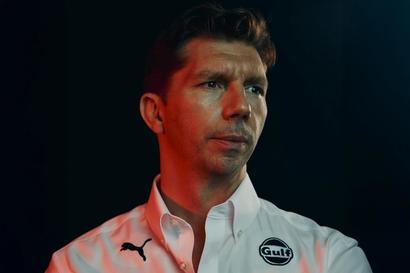

How Amalfi Jets Leveraged TikTok
Amalfi Jets leveraged TikTok by favouring story over spectacle. Each post carried a sense of ease, proving that even in the fastest medium, elegance can still take its time.
- Words: Rupert Taylor
In which a qualified pilot discovers that viral videos and G650s make surprisingly compatible bedfellows
You're scrolling through TikTok at 2 AM and sandwiched between a teenager doing a questionable dance and someone's cat exhibiting marginally more self-respect, you suddenly stumble upon a guy casually discussing the logistics of chartering a $120,000 flight to Dubai. For context on how much a private jet costs, that's actually on the higher end of single-flight charters. This isn't, as you might reasonably assume, some elaborate joke. This is Amalfi Jets, and they've just collected their 143rd millionth like.
Welcome to the future of luxury aviation, where the Venn diagram of "serious business" and "viral entertainment" has unexpectedly overlapped. Kolin Jones, the mastermind behind this gloriously audacious experiment, has built a private jet empire by doing what the old guard deemed absolutely insane: he made it entertaining. The result? Over 2.9 million TikTok followers, tens of millions of views, and what one can only imagine are some deeply confused competitors wondering whether they should fire their entire marketing team or just accept defeat gracefully.
Jones himself was initially horrified by the idea. Social media, he thought, was "not very elegant" for private aviation. You can picture the scene: a qualified pilot with a degree in aeronautics from Embry-Riddle Aeronautical University, staring at TikTok with the same expression you'd reserve for finding a hot dog cart parked outside Per Se. The industry, after all, has long operated with the discretion of a Swiss bank and approximately the same level of accessibility. Transparency? Absolutely not. Entertainment? Hell no. Mystique, exclusivity, and the faint aroma of generational wealth? Now we're talking.
But somewhere between corporate stuffiness and entrepreneurial brilliance, Jones had what can only be described as an extremely profitable epiphany.
The Reluctant Revolutionary
Before we go further, let's establish that Jones isn't some TikTok hustler who stumbled into aviation after watching Top Gun one too many times. The man is legitimately credentialed, holding not just a pilot's license but also the distinction of being one of the youngest members ever appointed to Embry-Riddle's Industry Advisory Board. He's built Amalfi Jets around safety standards so rigorous they border on paranoid: 3,500 vetted aircraft across 170 countries, with pilot hours, insurance requirements, and aircraft quality specifications so demanding that only a small percentage of the global charter fleet makes the cut.
In other words, this is a serious operation run by a serious person who just happens to have discovered that filming yourself taking calls from demanding clients is absolute gold for the algorithm. It's like discovering your exceptionally qualified surgeon also does killer standup comedy. Unexpected? Sure. But it doesn't make him any less qualified to operate.
The content itself is pure entertainment. Jones appears on camera, fielding calls from wealthy clients with the patience of someone who's genuinely heard every ridiculous request imaginable. There are negotiations, unusual demands, the occasional celebrity inquiry about ultra-exclusive travel experiences, and throughout it all, Jones maintains the demeanour of someone who finds the entire circus both exhausting and mildly hilarious. Their most viral video, featuring a repeat client named McKenna, has racked up over 30 million views. To put that in perspective, that's roughly the entire population of Texas watching your promotional content. Twice.
The Five Percent Solution
Now, before you assume the entire operation has transformed into an influencer circus with wings, let's talk numbers. Only about 5% of Amalfi's actual bookings originate from TikTok. Yes, you read that correctly. Ninety five percent of their business remains refreshingly traditional: wealthy people calling to book expensive flights, exactly as capitalism intended. The platform isn't replacing real business; it's simply making everyone aware that the business exists.
Think of it as the world's most effective billboard, except the billboard occasionally cracks jokes and responds to comments. The brand recognition has translated into what Jones, with admirable understatement, describes as "record growth" across web engagement and direct bookings. Most clients, he's quick to clarify, remain decidedly high-end and wonderfully straightforward. No brand deals proposed by influencers with 47 followers. No requests to pay in "exposure." Just people who want to fly privately and have the resources to actually make it happen.
What Jones has managed, quite brilliantly, is to exist in two dimensions simultaneously. Behind the scenes, Amalfi Jets operates with all the seriousness you'd expect: vetted aircraft, qualified pilots, and insurance documentation that would satisfy the most paranoid lawyer. On screen, however, he's the aviation equivalent of your most entertaining dinner party guest, demystifying an industry that's spent decades perfecting the art of being intimidatingly opaque.
The Old Guard Is Not Amused
The industry's response has been, one imagines, absolutely spectacular to witness. Picture the established players, with their decades of carefully cultivated exclusivity, watching some upstart rack up millions of views by simply... explaining what they do. It's like watching a Michelin-starred restaurant haemorrhage customers to a chef who started posting recipes on Instagram. The food is identical, but suddenly everyone knows it exists and wants it.
Jones has essentially committed the cardinal sin of luxury business: he made it relatable. He's shown people the mechanics, pulled back the curtain, and generally acted as if private aviation isn't some mystical art form accessible only to those born with trust funds. The sheer audacity of it all is magnificent.
The ripple effects have been fascinating to watch. Other young players in the aviation sector are now eyeing their social media presence the way a Wall Street executive might regard a skateboard. Could they? Should they? What would the board think? Jones has written an entirely new playbook: how to disrupt a conservative industry by simply refusing to be boring about it.
His philosophy, as outlined in various interviews, including an illuminating conversation with AeroTime in late 2024, centres on one beautifully simple premise: if you want attention, be interesting. Stand out. Be "over the top, or even ridiculous." It's marketing advice that would have given the old guard absolute heart palpitations. But then again, the old guard weren't exactly breaking the internet, were they?
The Content Machine (Population: One)
Scroll through Amalfi's social presence and you'll find Jones regularly starring in his own reality show. There are customer calls, celebrity requests, and surprisingly substantive insights into jet selection and international travel. There's behind-the-scenes content that actually provides genuine value instead of the usual corporate nonsense about "synergy" and "disrupting paradigms."
One particularly entertaining genre features influencers calling to propose trades.
"I'll promote your jets to my followers in exchange for a free flight to Mykonos!"
To which Jones responds with the enthusiasm typically reserved for jury duty. These calls are comedy gold, a masterclass in polite deflection while simultaneously creating content that basically markets itself.
Then there are the real bookings, the wealthy clients with their specific requirements, the logistics of flying someone's dog to Paris (yes, actually), and all the fascinating details of an industry that operates in a completely different universe from the rest of us. Jones has managed to make private aviation feel simultaneously aspirational and accessible, exclusive yet transparent. It's like if your most successful friend started a podcast: all the insider knowledge, none of the pretension.
The Democratisation of Aspiration
What's genuinely fascinating, beyond the numbers and the viral hits, is what this represents culturally. For decades, luxury brands operated on the principle of artificial scarcity and strategic opacity. Don't explain, don't engage, and absolutely don't let regular people peek behind the curtain. The mystique was the entire point.
Jones has thrown all of that out. Not because he's democratising private jet travel itself (let's be clear, it remains expensive as hell), but because he's democratising the knowledge of it. Anyone with a phone can now understand how the industry works, what it costs, and why certain aircraft matter. You're probably not going to charter a jet from watching his TikToks, but you're going to understand what's involved when you eventually can. It's aspirational content that respects its audience's intelligence, which in the social media landscape is shockingly rare.
The genius lies in the balance. Yes, there's spectacle. There are viral moments and quotable calls and the occasional bit of theatre. But there's also genuine expertise, real insight, and someone who clearly knows exactly what he's talking about. Jones hasn't dumbed down private aviation; he's simply stopped pretending it needs to be mysterious.
The Numbers Don't Lie
Here's where it gets really interesting. While traditional private jet companies were spending millions on glossy magazine ads that maybe 10,000 people would see, Jones was creating content that reached tens of millions organically. Zero ad spend. Just a smartphone, some editing software, and the willingness to look slightly ridiculous on the internet.
The business model is almost embarrassingly simple: create entertaining content that showcases what you do, let the algorithm do its thing, and watch as brand awareness translates into actual revenue. It's not rocket science, but in an industry as traditionally stuffy as private aviation, it might as well be.
And the content keeps evolving. Jones has figured out what works: authenticity beats polish every single time. A slightly awkward phone call with a demanding client? More engaging than any scripted commercial. A genuine reaction to an absurd request? Better than any focus-grouped marketing campaign. The man has basically turned his day job into content, and the content into a customer acquisition funnel that would make any CMO weep with envy.
The Bigger Picture
In the end, what Kolin Jones has achieved extends well beyond clever marketing or viral success. He's fundamentally changed the conversation around how luxury businesses operate in the digital age. Where others saw social media as beneath them, he recognised it as the most powerful tool for building genuine connections at scale. Where traditionalists worried about appearing "too accessible," he understood that authenticity and exclusivity aren't mutually exclusive. In fact, they complement each other perfectly.
Amalfi Jets' trajectory suggests we're witnessing a broader shift in luxury marketing. Social engagement isn't just tolerated anymore; it's essential. Brand persona matters as much as balance sheets. A well-timed TikTok might genuinely be worth more than a full-page ad in a luxury magazine, if only because exponentially more people will actually see it and, crucially, remember it.
The traditional players can complain all they want. They can grumble about dignity and decorum and how things used to be done. Meanwhile, Jones is over here accumulating followers at a rate that would make a Kardashian jealous, all while running a legitimately excellent aviation business with proper safety standards and genuine expertise.
Revolutionary? Absolutely. Profitable? The numbers speak for themselves. Elegant? Well, that depends entirely on who you ask. The old guard would probably say no, but they also thought the internet was a fad and that print advertising would last forever.
Jones has stopped worrying about what the establishment thinks. He's too busy reshaping the industry to care about their opinions. And besides, when you're pulling 30 million views on a single video, you can afford to ignore the critics. Quite literally, in fact. The jet's already been chartered, the client's already boarded, and Jones is probably filming another video that'll go viral tomorrow.
The lesson here isn't just about aviation or TikTok. It's about recognising when an entire industry is ripe for disruption and having the guts to actually do something about it. Jones saw an opportunity where everyone else saw risk. He zigged when the entire industry was zagging. And now he's got the followers, the revenue, and the case study to prove he was right all along.
Not bad for someone who thought social media wasn't elegant enough for private jets.


